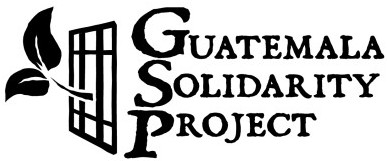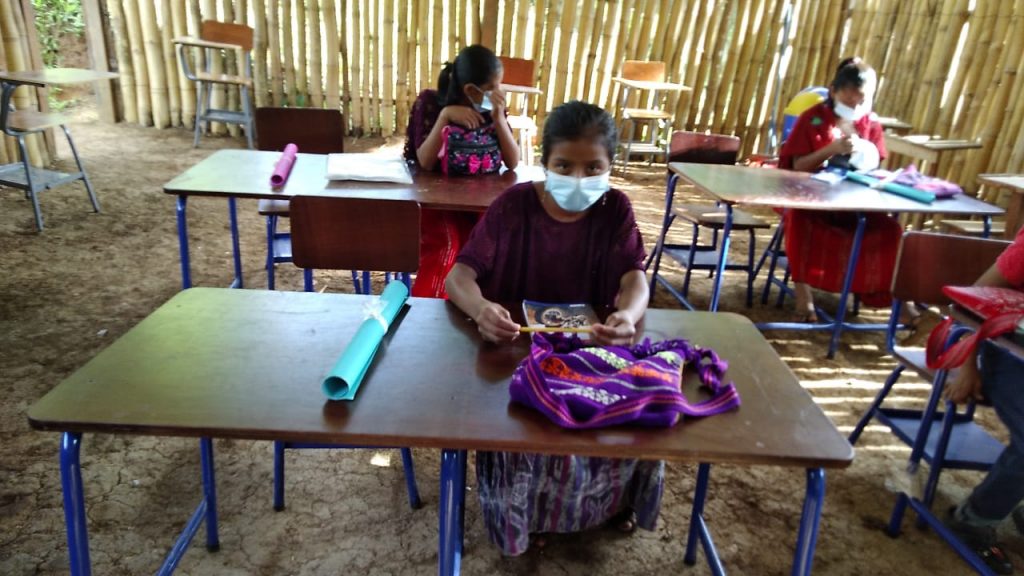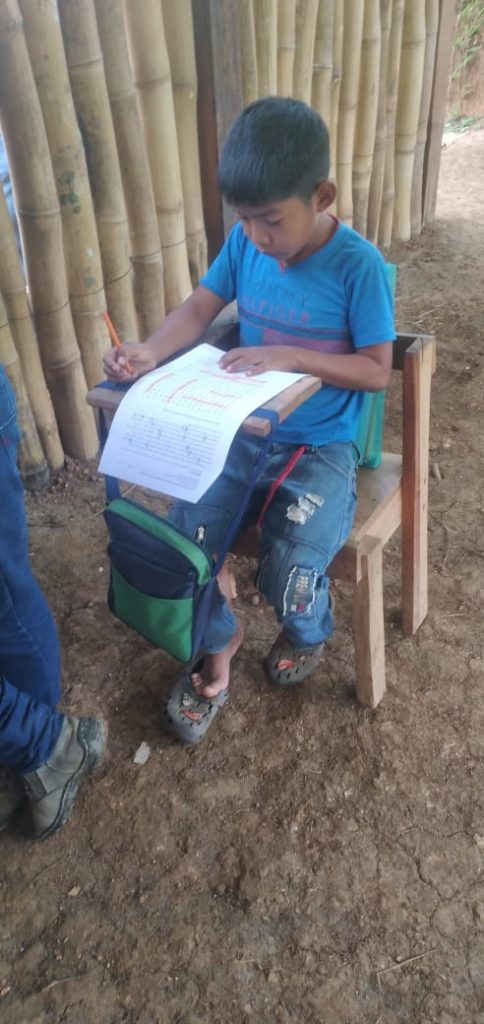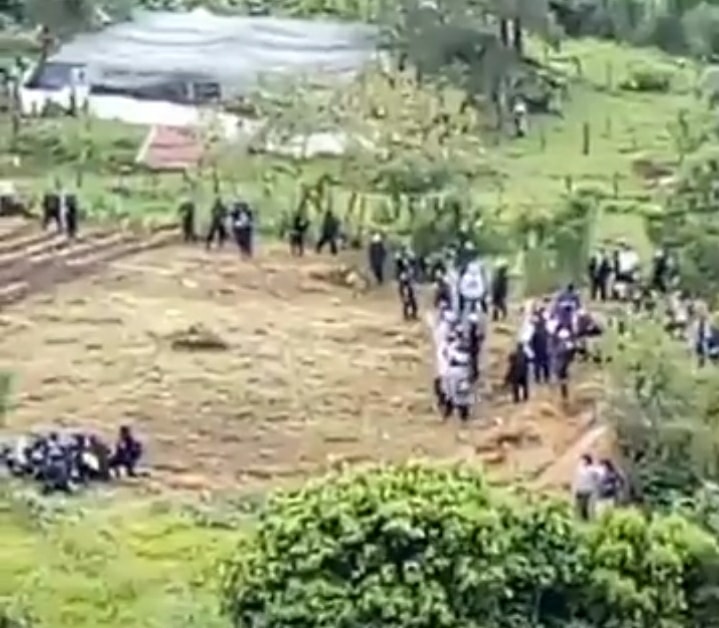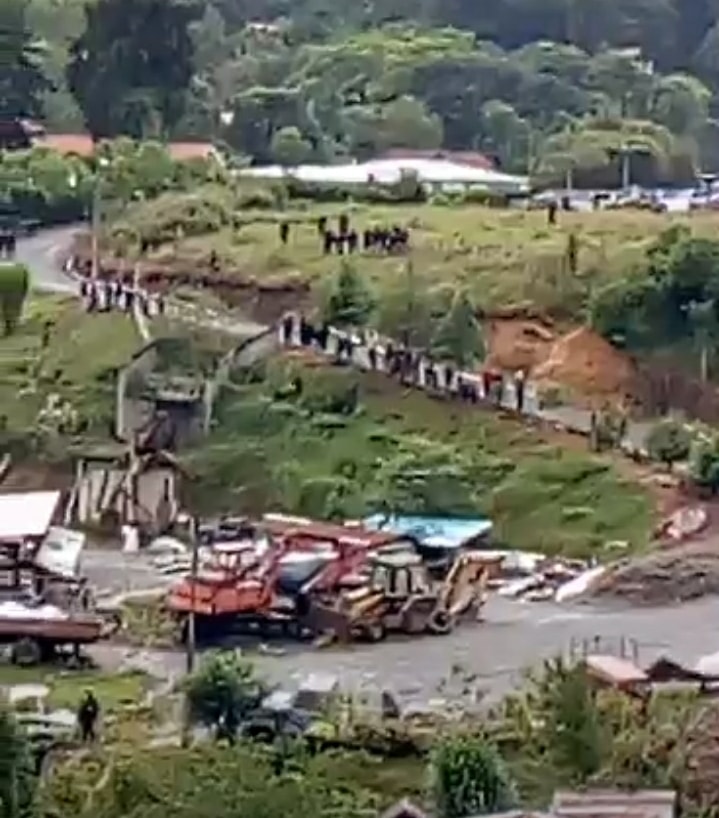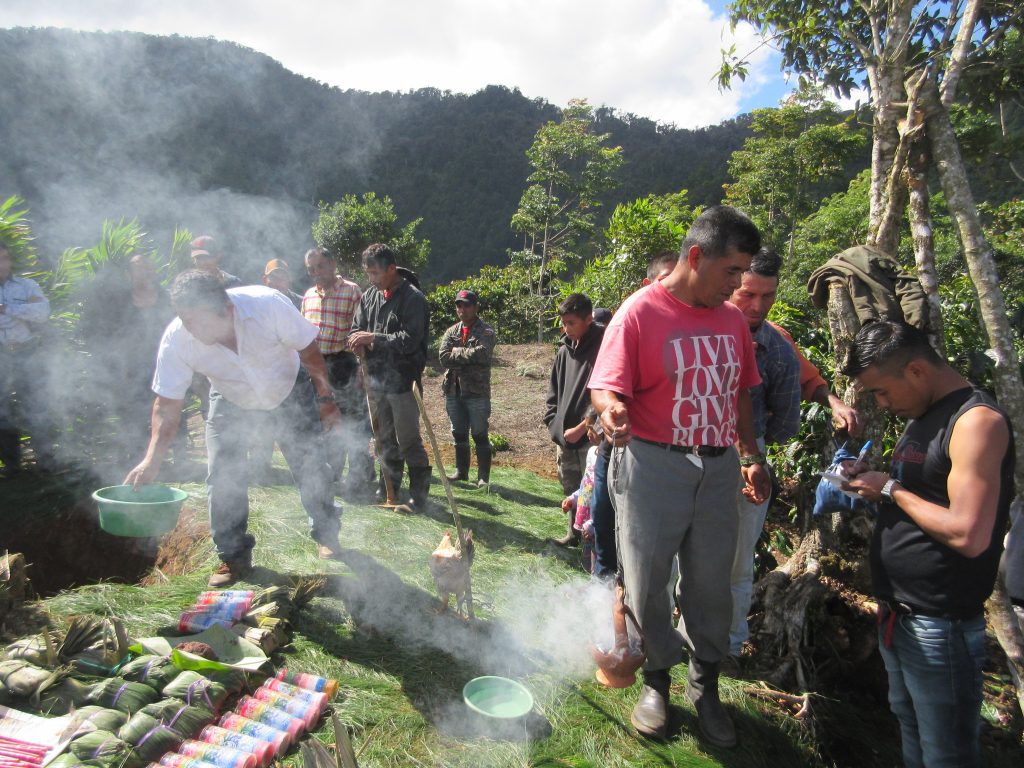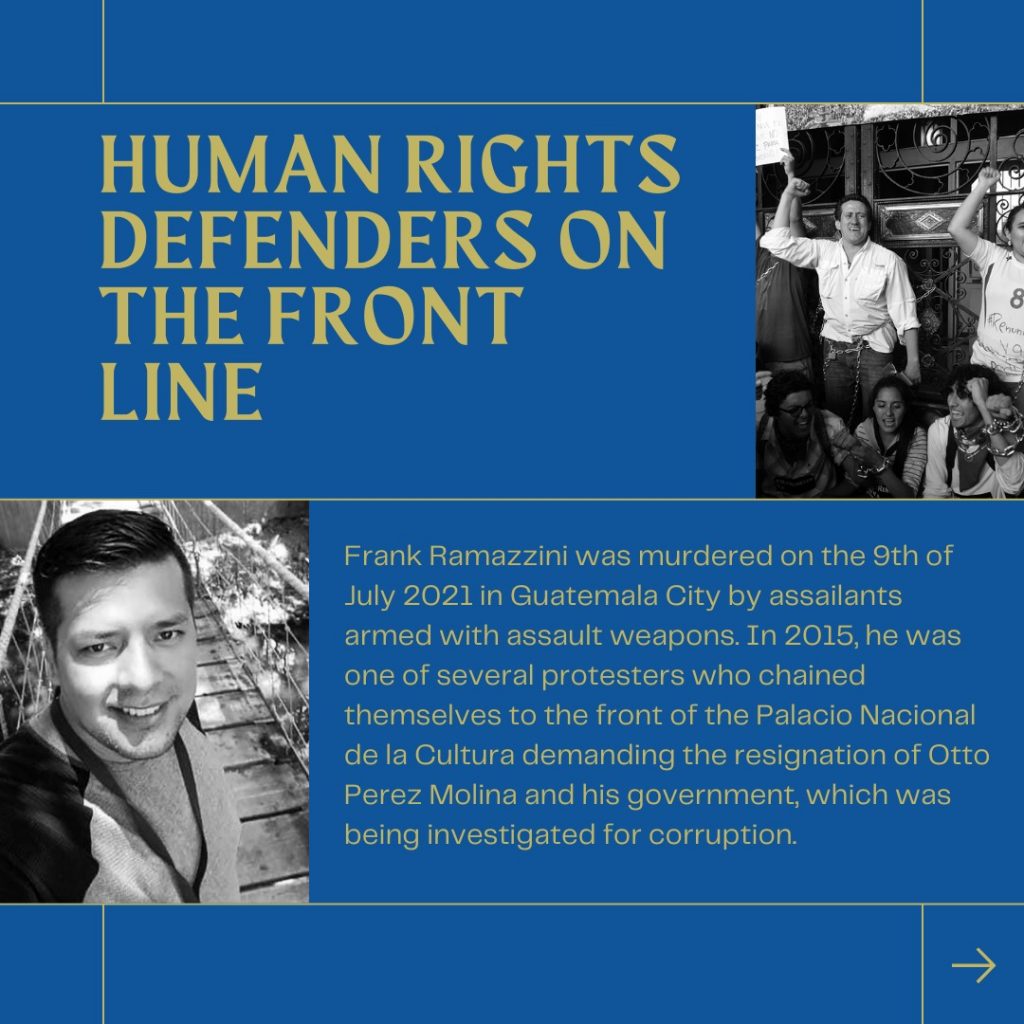Guatemala Solidarity Project Quarterly Report, November 21, 2021
As 2021 comes to a close, US-backed police and soldiers are marching alongside heavy equipment to support illegal mining in indigenous Q’eqchi’ territory. The Guatemalan government has declared a State of Siege (a combination of martial law, suspension of individual constitutional rights and a curfew) to repress indigenous communities who oppose this looting of their territory. At the same time in the same region, GSP’s efforts to combat forced displacement, malnutrition, illiteracy and rape are stalling due to COVID-related reductions in fundraising.
There are two easy ways you can take action right now in solidarity with our partners in Guatemala. One important way is for people in the US to contact their members of congress and ask that they oppose US support for the State of Siege. Details on the State of Siege and how to support our related efforts in congress are at the end of this report, so you can skip to the bottom if you want to take that action right now!
A second way you can take action right now is by making a donation. No donations are used to support our lobbying efforts. Instead, all donations go directly to our partners to support their priorities on the ground. No funds are kept by the GSP for overhead or any other purpose. You can donate via our website or by writing a check to UPAVIM and mailing it to UPAVIM, PO Box 63, Marshfield, VT 05658. You can also donate via Venmo @SolidarityGuate (search under business). We thank our fiscal sponsor, the volunteer-run UPAVIM Community Development Foundation, a US 501(c)3 non-profit tax-deductible organization, for supporting us and ensuring that all funds go to our partners in Guatemala.
This quarterly report features updates on some of the areas we are working, including links to various articles recently authored by GSP volunteers. Young GSP volunteers are helping to expand our social media presence, so to stay informed and help us get the word out please follow us on facebook (GuatemalaSolidarityProject), instagram (GuatemalaSolidarityProject) and twitter (@SolidarityGuate).
Mobile Schools Continue, but Urgently Need Support
The school year in Guatemala comes to a close in December, which also marks the end of the third year of the GSP mobile school program. Because the government systematically denies school access to indigenous communities, our partners have directed us to focus on part time schools so that more communities will benefit. This means that each participating community receives classes for only one week per month, which is not sufficient. However our partners have this preference so that more communities can benefit.
The mobile school program is integrated with our partner communities’ efforts to gain recognition of their land rights and to pressure the government to fulfill their constitutional obligation to provide school access to all children. Recently we have had success in winning legal recognition of schools in our partner communities in Pancuz and Secoyon. Thank you for helping make this possible!
Our partners believe that education is fundamental. Unfortunately, because of continued COVID-related fundraising struggles we have had to significantly scale back the mobile school program. The new school year begins in January, and we need your support now in order to commit to operating the mobile schools for another year and bringing access to education to hundreds and perhaps thousands of children.
Murder of Ramon Jimenez
On September 15, indigenous Xinca leader Ramon Jimenez of the Peasant Development Committee was murdered. GSP activists have collaborated with Jimenez for years in supporting Xinca rights in the southern department of Jalapa.
Much of this struggle has been against international mining companies that violently displace Xinca communities from their lands and create massive pollution. Xinca communities have had historic success in defending their rights against illegal mining. In November of 2016, the Xinca municipality of San Carlos Alzatate, Jalapa organized a referendum in which 98% of voters rejected open pit mining in the area. GSP activists observed the referendum.
In the face of systematic repression by the government, Xinca people have also succeeded in using roadblocks and other nonviolent organizing to shut down the Escobal mine. The Escobal mine had been the second most profitable silver mine in the world, but this profit was left in the hands of investors and corrupt politicians while indigenous communities were left with pollution, deforestation and extreme poverty. This murder is also intended to threaten Xinca organizers currently pressuring to carry out a fair referendum about the future of mine activity.
This success has made Xinca human rights defenders such as Jimenez targets of violence. We will continue to stand with our indigenous Xinca partners as they courageously organize for their rights.
Eviction of Rincon de San Valentin
On October 19, police and private security violently evicted the indigenous Poqom’ community Rincon de San Valentin. Community members had worked without pay on an area plantation for generations, and when they organized for their rights in recent years they became the victims of government and business repression. Community members have faced arrest, rape and beatings based on their nonviolent organizing.
The GSP will continue to work closely with community members, even as they are displaced. We need your donations to support related legal actions defending communal land rights.
Police escort heavy equipment to destroy homes in Rincon de San Valentin
Fighting for Justice for Indigenous Women who have been Raped
Guatemala has one of the highest rates of gender-based violence in the world. According to the Women’s Observatory, approximately 99% of cases of violence against women in Guatemala remain in impunity. Indigenous women are at particularly high risk, and are often systematically targeted by the government and corporations in attempts to drive them off of their land.
For example, María is a young woman in one of our partner communities who was raped three years ago by supporters of a hydroelectric dam. Her father had been organizing against the dam because of the environmental destruction and forced displacement it would cause, and the family believes María was targeted for this reason. María became pregnant, and when she gave birth she was tricked into signing documents in Spanish. She speaks Q’qechi’ and could not read the documents, but was told they were routine paperwork. Then her baby was taken from her, and she was later informed that the documents gave up her custody to her child. We are currently collaborating with the family to regain custody of her child. We also have hired a female nurse to focus on women’s health issues in our partner communities.
For more information on Maria’s story, visit http://www.guatemalasolidarityproject.org/justice-for-maria/
Indigenous Q’eqchi’ Leader Dragged out of Church by Police
Gerardo Chun, in red shirt, leading a Q’eqchi’ ceremony in 2020
Indigenous Q’eqchi’ human rights defender Gerardo Chun Cahuec was participating in Catholic Church services on Sunday, August 22 when police entered the church and told him he was going to be arrested for “land theft.” The GSP has worked closely with Chun, who has helped coordinate much of our clean water and malnutrition programs. Chun has exposed the theft of indigenous lands by military officials and has thus become a target.
A large crowd quickly gathered and surrounded the police officers, reminding them that the arrest would be illegal because there was no valid arrest warrant. The officers eventually admitted that it was true and that they could not legally arrest Chun. Instead they said they would “come back another day.” Chun has since received numerous death threats.
Standing with Victims of the Alaska Massacre
On October 4, 2012, Guatemalan soldiers opened fire on indigenous demonstrators in the town of Alaska, killing six and injuring dozens. Nearly 10 years later, no one has been held responsible for this massacre. The GSP is accompanying our partners who have recently been able to restart hearings for the soldiers who led the massacre. They are facing death threats and intimidation, and we will continue to support them until they achieve justice.
Right now: Legal opposition to the eviction of thousands of indigenous peasants
As we prepare this quarterly update, thousands of Guatemalan police have gathered in Purulha, Guatemala, allegedly with orders to violently evict over 30 indigenous Q’eqchi’ and Poqom’ communities including San Valentin mentioned previously The GSP and our partners have quickly mobilized to take legal action to block these evictions.
Our efforts so far have at least suspended the evictions, but the large police concentration remains in Purulha and further legal action is needed. We need your donations in order to continue to stand with our partner communities in this area who are targeted by multinational corporations who want to loot natural resources in the region.
Human Rights Defender Frank Ramazzini murdered
Frank Ramazzini was a human rights defender who was murdered on July 9. Ramazzini was perhaps best known for courageously chaining himself to the National Palace government building for several days in 2015 along with other activists, demanding the resignation of General Otto Perez, who was President at the time. Perez was arrested shortly after.
At the time of his murder, Ramazzini was heavily involved in protests calling for the resignation of current President Alejandro Giammattei. As president of the Justice and Human Rights Inspector, Ramazzini was also heavily involved in exposing and denouncing torture in Guatemalan prisons.
Guatemalan Government using Pegasus Spyware to Target Human Rights Defenders
Many of you are familiar with the ongoing targeting of indigenous leaders by government authorities. As much of our work is targeted towards holding Guatemalan leadership accountable for its abuses, this update is focused on a particularly concerning development. The Guatemalan government has Pegasus, which despite the seemingly innocent name, is a tool that can access your phone’s communications channels, passwords, microphone, and camera by slipping a virus into your phone (Sas). Obtained through an Israeli arms dealer, the General Directorate of Civil Intelligence (DIGICI) has access to Pegasus as well as a plethora of other spyware (Sas).Â
DIGICI has wasted no time in using these tools to continue to repress and monitor political dissidents and activists. In fact, Guatemala newspaper Nuestro Diario notes that DIGICI’s victims were not random; they were selected for their political and social convictions or because they were critical of the actions of current authorities. These behaviors are so well-known that in 2019 the office of the UN High Commissioner for human rights released a press briefing regarding rising violence against human rights defenders in Guatemala, noting the role of surveillance and the abuse of criminal law to target activists defending land rights. Such behavior is grossly inappropriate for a so-called “democratic” government.
Whatever the alleged justification for possessing and using such technology, recognize that for each benefit there is a greater cost to be paid. This technology is not made for policing actual criminals, nor should we conflate it with such. It has and will continue to be used to target political dissidents. Whatever security the use of Pegasus promises to bring will be insignificant compared to its repressive potential. These excuses only help to erode the rights of our partner communities, and of Guatemalans as a whole. To assume otherwise of the Guatemalan Government, a regime known for its systemic corruption and catering to elites, is beyond naive.
Despite this reality, the US Congress still provides security aid to the Guatemalan government. The US House recently passed the National Defense Authorization Act (NDAA) to “provide training and equipment to the national security forces of one or more foreign countries” for purposes that include “Cyberspace security and defensive cyberspace operations” (10 U.S. Code § 333). Rather than protecting the privacy of their citizens, the Guatemalan authorities are installing viruses to track and monitor their critics.
Continuing to throw money at a corrupt and ineffective government will do little to help Guatemala. It only provides more opportunities for elites to fill their pockets, while further giving them means to effectively repress the population. Only Representatives Tlaib (MI), Omar (MN), Schakowsky (IL), Norton (DC), Hank Johnson (GA), Grijalva (AZ), Jesus Garcia (IL), and Jayapal (WA) voted for an amendment to block this security “aid” to Guatemala. It is time for Capitol Hill to rethink its approach. As the current State of Siege in El Estor has shown us, the priorities of the Guatemalan government still ignore the needs of the indigenous communities it claims to protect. We are hearing from our partner communities that police and military officials have been targeting the homes of indigenous leaders and journalists, and many of us are worried that Pegasus may play a role in this persecution. These concerns are especially alarming given that even the United States has allegedly ceased its support of Pegasus, adding NSO Group, the company behind its creation, on a trade blacklist. Please call your members of congress and request that they oppose funding the repressive security forces of Guatemala, including Pegasus and other intelligence technology designed to target political dissidents and human rights activists.
State of Siege Supports Illegal Mining with US Funding
The Fenix mine is one of the largest nickel mines in the hemisphere. The mine and its parent companies (it has switched hands between various international corporations in recent years) have been accused of using gang rape, arson attacks and assassination of indigenous leaders to expand its mining operation. In 2019, the Constitutional Court of Guatemala ruled that the mine had been operating illegally since 2005 and that it must shut down. After a series of appeals, the court reaffirmed in 2020 that the mine must immediately cease operations.
The mine continued to operate as indigenous leaders organized further legal action, but the government continued to ignore the law. On October 3, 2021, indigenous communities began a permanent nonviolent roadblock of the area surrounding the mine. They permitted all vehicles and persons to pass except for mining cargo and equipment. The government responded with occasional threats and intimidation, until on October 23 when thousands of police and soldiers attacked protestors. The following day the government announced a State of Siege in the indigenous Q’eqchi’ region of El Estor which surrounds the mine. A State of Siege suspends constitutional rights for a minimum of one month and gives the military authority to conduct house raids and arrests without warrants.
In the weeks since then we have had to suspend some of our adult literacy, malnutrition and women’s health programs in the region because they are deemed illegal under a State of Siege. Heavily armed police and soldiers have been raiding the homes of indigenous leaders in the area, including plaintiffs in rape and murder cases involving the mining company and journalists who have covered the violence. They have stolen telephones and documents, arrested community leaders without warrants, and appear to be gathering intelligence on human rights leaders and organizations. On November 16, US-backed Guatemalan police and soldiers conducted an arson attack against the indigenous community Palestina Chinebal in El Estor, burning down the homes of hundreds of people.
Meanwhile the US congress just approved new military and police “aid” for Guatemala, ignoring the concerns of human rights organizations. The Biden administration has decided to support the Guatemalan military in hopes that they will violently confront immigrants at the border of Guatemala where such repression receives less attention than violence at the US-Mexico border. Not only is this strategy in blatant violation of human rights, but it will also lead to increased forced displacement and migration. In the short term the military may block some migrants from escaping to Mexico, but at the same time the military is forcing many more thousands of indigenous people off their lands to support the theft of natural resources. Many of these displaced people will later make the dangerous journey to the United States, where ironically they will be labeled “illegals” even though it was US corporations and US military support that forced them off their lands. The best way that the US can slow migration is by supporting the rights of indigenous people so that they can choose to remain in their original territory. Instead the US government is supporting the repressive Guatemalan military and police, as well as corrupt international corporations.
If you are able to take action by the end of the day on November 23, please call and email your US House Representative and ask that they sign on to the Dear Colleague letter calling for an end to US support for the State of Siege in El Estor. Below is a sample script for making such a call:
Sample script:
Hello my name is _____ and I am calling to request that the Representative sign on to Representative Grijalva’s dear colleague letter calling for an end to US support for the State of Siege in indigenous Q’eqchi’ territory in Guatemala. Under the State of Siege, Guatemalan military and police have conducted arson attacks against indigenous communities and have raided the homes of journalists and plaintiffs in rape and assassination cases, all to support the expansion of illegal mining in the region. You can contact Representative Grijalva’s office to sign the letter. The deadline to sign is Tuesday November 23. I want to know if your office opposes the use of arson attacks, rape and murder against indigenous people. Please let me know your response at your earliest convenience. You can send me an email at ________ with your response. Thank you.
